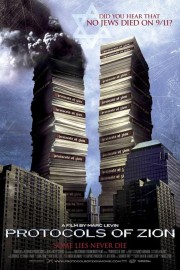Protocols of Zion
With this documentary, Marc Levin did not set out to debunk the Protocols of the Learned Elders of Zion. That, in and of itself, could be a strike in its disfavor, even though the notorious 19th Century Russian screed allegedly outlining how Jews plan to take control of the world has been debunked by more learned scholars than Levin. Instead, Levin made his film in a way of trying to understand why- almost 100 years after their publication- the Protocols had endured as fuel for a world’s antisemitic fire. Less than two decades after Levin’s film, conspiracy theories like QAnon, and violence like the Tree of Life shooting, have taken antisemitism to its most explicit heights since the 1930s. I think Levin’s film is worth watching and remembering, if only to show us whom we are throwing our lot in with if we accuse George Soros or the Rothschilds of controlling the world, or railing on against the idea of a “New World Order.”
The older I get, and the more I’ve gotten into covering film festivals, documentaries have become an essential part of my viewing. Even more so than narrative filmmaking, documentaries have the power to show us the world from a different perspective, and to help us learn and grow. I think it’s important for us to be able to expand our view of humanity beyond our own bubble, and documentaries can be invaluable in that. The more information we take in about the world, the stronger we become mentally. But it’s important for us to question the value of any information we take in if it results in us starting to hate other people, whether it’s for their gender, race or religion. A lot of the people Levin encounters on the ground in “Protocols of Zion” do not question where their beliefs come from- if they hear, for example, that no Jews died in the 9/11 attacks, they simply take it as fact. They may look further into those beliefs, but usually just to confirm them, not question them.
Levin (who directed 1998’s “Slam”) was inspired to make “Protocols of Zion” after the driver of a cab he was in mentioned the “no Jews died on 9/11” conspiracy theory; when Levin questioned him on it, he pointed to the Protocols of the Learned Elders of Zion. Levin gives us a history lesson on when the Protocols were first introduced into society- during the Pogroms against Jews in Russia- and how they made their way to American (courtesy Henry Ford and his series, The International Jew, as well as how they have remained the Big Lie of the modern era of conspiracy theorizing. I like how Levin uses his own conspiratorial history- surrounding the JFK assassination- as a way into the film, which shows he and his father trying to understand the enduring hatred of Jews in society. It’s shocking how explicit it is in this film.
I wonder how many of Levin’s interviews realize that he, himself, is Jewish. Do the Black men on the street shouting the 9/11 conspiracy theory know? Does the skinhead whom Levin joins in his organization’s inventory barn, which includes multitudes of Nazi memorabilia, as well as the Protocols (which are sold out)? Throughout, we hear an audio cassette recording of the Protocols for reference, as well as see images from Muslim programs that are extraordinary in their antisemitism. Almost twenty years later, the film is prescient in how it illustrates the makings of what would become known as the alt right, and heartbreaking because it shows how easily it is for people to gravitate towards hate rather than understanding. Ultimately, I think a sense of understanding, of empathy, is what I think documentaries bring to the world of film more than anything, even when they aren’t able to fully answer some of the simplest questions their subject has to offer- in this case, why is it so important for people to believe the Jewish people are responsible for the world’s ills? That shouldn’t be a hard question. It’s awful that we still find ourselves faced with it.










